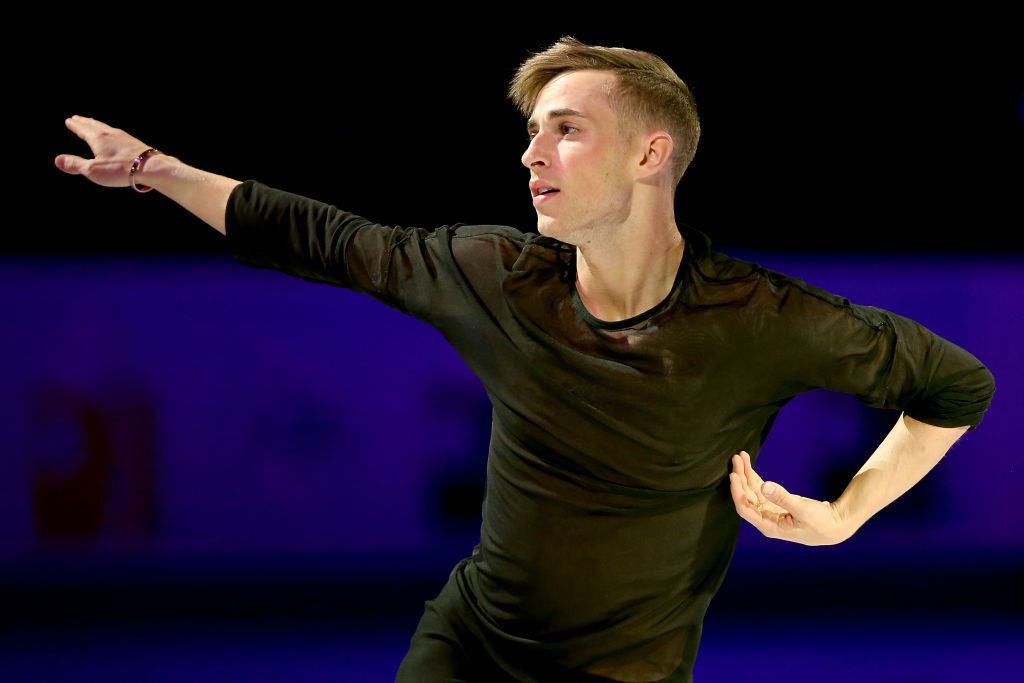Less than one percent of the athletes competing at the 2018 Winter Olympics will be openly LGBTQ; nonetheless, the path to progress continues to grow.
While the exact number of LGBTQ athletes at the upcoming Olympics in South Korea is hard to know, the Advocate reported that as many as a record 11 openly LGBTQ people could compete, up from the seven at Sochi in 2014. This Olympics will also mark the first time any gay man has competed in the Winter Olympics, as out figure skater Adam Rippon made the U.S. team, qualifying Saturday night.
A first-time Olympian, Rippon placed fourth at the 2018 U.S. Figure Skating Nationals, where the decision on who will attend the Olympics is made the following day. His strong international track record put him over second-place finisher Ross Miner for a spot on the Olympic team, which brings three men.

With his admission to Team USA, Rippon is the first out gay man to officially be on the American roster for 2018, as the other likely candidate, freestyle skier Gus Kenworthy hasn’t officially made the team (he’ll find out January 22). Together, the two will likely be the sole queer people for Team USA, and among the small group of out queer athletes at the Olympics.
Rippon is one of the few openly gay figure skaters still competing.
Johnny Weir came out in his autobiography in 2011, one year after competing in the 2010 Olympics. However, the reaction to Weir’s extravagant outfits and flamboyant image highlighted the homophobia in figure skating.

Commentators during the time made homophobic comments on his costume and personality, whereas his scores were often under what some believed they should be.
A silver medalist at the 2014 Winter Olympics, Gus Kenworthy’s coming out story was featured on the cover of ESPN Magazine in 2015, Coming out hasn’t stopped Kenworthy’s momentum in his sport, as he’s won multiple championships since. He’s a favorite to medal at the upcoming Olympics.
Kenworthy is also among the LGBTQ professional athletes receiving attention from advertisers and sponsors. Tennis Legend Martina Navratilova once said she lost millions in sponsorships after coming out in the ‘80s, and fellow tennis player Billie Jean King often talks about the homophobic attitudes of earlier days that made life harder for out athletes.
A Sports Business Daily article published in October 2017 noted that Kenworthy coming out has benefited him financially, as he’s already signed deals with Visa, Toyota, Ralph Lauren, Deloitte, and 24-Hour Fitness ahead of the upcoming Olympics.

Kenworthy’s status as a medal favorite, alongside his fun, bubbly personality, and his touching coming out story are bound to make Kenworthy a focus during NBC’s coverage of the Winter Games. He’s already begun popping up in commercials on NBC promoting the Olympics and, depending on his performance, could become an even bigger star. Kenworthy’s platform will also reach people who may not normally be exposed to queer people.
In 2014, Abigail Jones wrote about the “frozen closet” for Newsweek, saying that even in a sport that spotlights artistry, being effeminate is not entirely welcome. She notes that men’s figure skating has moved toward trying to be more “macho” with a focus on the athleticism rather than artistry.
Jones wrote that “efforts to protect (and project) the macho reputation of male skaters have been underway for decades, and skating clubs and organizations tried to lure boys by playing up the masculinity of the sport and virility of its athletes.”
As it stands, Rippon will join openly gay figure skaters Eric Radford of Canada and Luis Fenero of Spain at the 2018 Olympics, and within the group of the first gay men to compete at a Winter Olympics.


Articles in New York Magazine and Rolling Stone have questioned why pro sports have problems with LGBTQ people, citing the culture prioritizing hypermasculinity. Will Leitch of New York Magazine wrote that for gay male athletes, “in such a fiercely competitive industry, the last thing anyone wants to do is give any employer, no matter how open-minded he might believe him to be, a reason not to give him a chance.”
Without a doubt, coming out is a personal and difficult decision that not all people believe is necessary. After all, a person’s choice on whether they come out is theirs and theirs alone, but the benefits of having out athletes are important.
Out athletes not only help show new audiences that gay people can compete at the same level, but they also disprove stereotypes about gay people both in their respective sports and sports. Kenworthy said in an interview to TIME that “once, when he was late for a training session, a skier Kenworthy long admired called him a “fag,”” however after his coming out story was published in ESPN, “the same day, the skier who had ridiculed him for missing training called, choked up. He apologized, insisting he never meant to hurt Kenworthy.”
It remains to be seen how out athletes like Rippon and Kenworthy will be embraced by Team USA and the public. Hopefully, they’ll not only be welcomed, but inspire other queer athletes to live proudly and keep competing.
Don't forget to share:
Help make sure LGBTQ+ stories are being told...
We can't rely on mainstream media to tell our stories. That's why we don't lock our articles behind a paywall. Will you support our mission with a contribution today?
Cancel anytime · Proudly LGBTQ+ owned and operated
Read More in Culture
The Latest on INTO
Subscribe to get a twice-weekly dose of queer news, updates, and insights from the INTO team.
in Your Inbox













